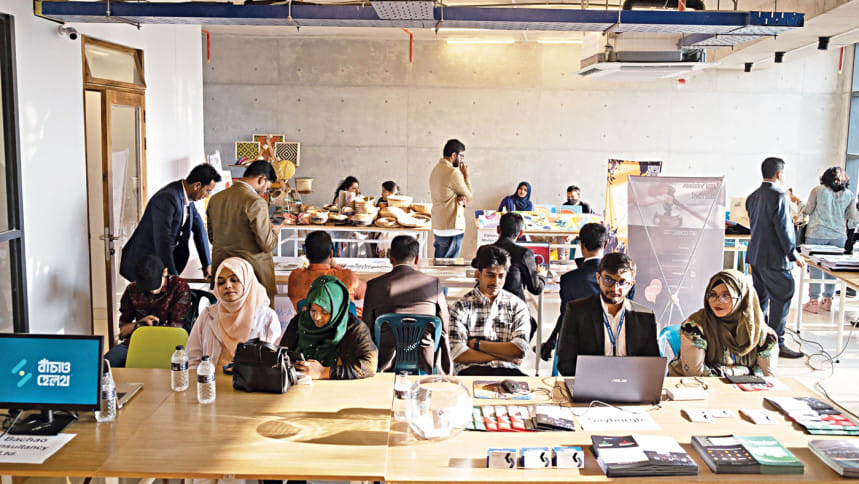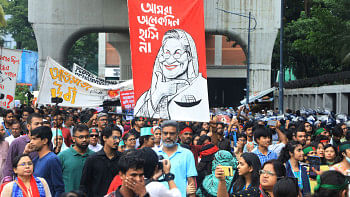Coworking spaces helping small firms save big

When Mohammad Oli Ahad founded Intelligent Machines back in 2018, finding a coworking space called Moar was a big relief as it helped save on numerous office expenses.
Employees of the artificial intelligence company, who are mostly IT engineers and coders, can work remotely given that they have the required digital devices, such as a laptop or smartphone.
Coworking spaces provide the option to lease desks and rooms on a monthly, daily or hourly basis with the equipment available, including Wi-Fi and dining space, being shared by the renters.
And so, freelancers, startups and even small teams of multinational companies in Bangladesh are increasingly opting for coworking spaces to keep costs low during the early stage of their business.
Coworking spaces provide the option to lease desks and rooms on a monthly, daily or hourly basis with the equipment available, including Wi-Fi and dining space, being shared by the renters
"This is a huge advantage, especially for those who start a new venture," Ahad said.
For example, Intelligent Machines, now a top artificial intelligence company, currently spends an average of just Tk 20,000 on rent each month.
"While very few people knew about it [co-working spaces] a few years back, the concept is getting popular now as more people are using the facility," he added.
Coworking spaces have been gaining popularity over the past six or seven years as small firms and individuals require affordable working spaces, especially in places like Dhaka where rent is exorbitant.
Nabila Nowrin, who co-founded Moar in 2015, said they provide affordable, productive and safe shared workspaces.
"Our mission is to support the sustainable growth of businesses in Bangladesh," she added.
Hubdhaka became one of the first coworking spaces in Dhaka when it was launched in 2014 with global office-space provider Regus having opened its facility in the country that same year.
The concept took off after 2015 with 15 firms, such as Cospace, Workstation 101, Bonik, Locus, AKOTA and Shuru Campus, now offering coworking spaces in the capital city.
Nowrin, who is an architect by profession, said she started doing background research on coworking spaces in 2013 before going on to open Moar through a soft-launch in Dhaka's Banani.
Initially, most of her clients were foreigners and so, the business took a hit following the terrorist attack on Holey Artisan Bakery in Dhaka in July 2016.
"But we officially launched in 2018 and then witnessed a steep rise in business and eventually opened another space in Dhanmondi," Nowrin added.
Moar suffered another downturn after the outbreak of Covid-19 as the company was forced to close its doors during the lockdown period.
However, this led to more opportunity as many people came to understand that they can work in a hybrid model, doing away with the need for a permanent office.
She then said that many international companies, such as global ridesharing platform Uber, initially started their business in Bangladesh at Moar.
"In addition, local employees of cross-border digital payment solutions provider Payoneer still work here," Nowrin added.
She went on to say that other than affordability, another big advantage of renting coworking spaces is that it is a hassle-free experience as the owners take care of cleaning, security and other issues.
"A fledgling firm can just hire people and tell them to start working from a coworking space," she said.
Another benefit of coworking spaces is that they facilitate the sharing of ideas, knowledge and experience as people of different backgrounds are all working in the same area.
Besides, fostering professional relationships in these spaces can even help people explore opportunities for work outside their particular area of expertise.
Moar opened a new branch on Gulshan link road in 2021 and relocated its Dhanmondi branch to Shaptak Square the following year.
Now, the company has a total of more than 15,000 square feet for rent across its three branches, which register a monthly revenue of over Tk 25 lakh collectively.
"We want more entrepreneurs to come and set up coworking spaces," Nowrin said.
Fahad Ibna Wahab, founder of CoSpace, echoed the same.
"Coworking space is very popular idea worldwide but there are still very limited options for startups to get such facilities in Dhaka," he said. As per official statistics, 90 per cent of startups fail in just one year with most having invested heavily on office expenses, which are not recoverable.
"If there are more coworking spaces, people would get used to the idea and this business would gain popularity. Also, firms would not have to invest a big amount for an office," Wahab added.
CoSpace currently has three branches in Dhaka and plans to slowly expand with its fourth branch set for launch within three months.
Wahab said the huge sums that have to be paid as a security deposit when setting up coworking spaces is the biggest obstacle for them.
Eushra Nashmin, CEO of WorkStation101, said her company was founded keeping startups in mind.
"We want to help resolve all the struggles a startup goes through at the initial stage of business, namely finding the perfect office with all the required amenities to impress their clients," she added.
WorkStation was launched in January 2020 in Uttara and is currently working on expansion.
"Our aim is to help startups in such a way that they can fully concentrate on their business and take it to a level that it becomes so big they will need an office of their own. This will be our true achievement," Nashmin said.

 For all latest news, follow The Daily Star's Google News channel.
For all latest news, follow The Daily Star's Google News channel. 








Comments